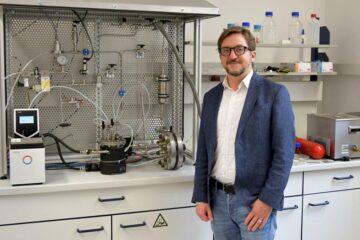Nucleic Fluorescent Probes for the Specific Detection of Single Base Alterations

</a><strong>Technology</strong><br>The present invention relates to forced intercalation probes (FIT-probes) based on nucleoside analogues with fluorescent artificial nucleobases. Thereby the nucleoside analogue is incorporated into DNA or RNA in the place of a single native base.<br>As such, FIT-probes may be employed in a large number of applications including genetic diagnostics, disease predisposition, pharmacogenetics and pathogen detection. The FIT-probes exhibit a simplistic mode of action and are able to detect single base alteration. They further possess few design constraints and show melting peak data which can be interpreted easily. The assay has been demonstrated to function efficiently directly from samples without prior purification of nucleic acids making the probe technology suitable for point-of-care diagnostics.</p>
<p><strong>Benefits</strong> <ul> <li>More specific and sensitive than common PNA probes</li> <li>First time manufacturing of DNA probes</li> <li>Abdication of linker enhances dye properties</li> <li>Enhanced sensitivity as probes differ between correct and incorrect hybridization</li> <li>Application at room temperature</li> <li>Wide range of application</li> <li>DNA probes allow detection in living cells by Fluorescence in situ hybridization (FISH)</li> <li>Enzyme activity is not influenced</li> <li>Inexpensive production</li> </ul> <p><strong>IP Rights</strong><br> EP Patent Application filed 09/2009<br> US Application filed 03/2012 <br> <br> <strong>Patent Owner</strong><br> Humboldt-Universität zu Berlin<br> </p>
Weitere Informationen: PDF
ipal GmbH
Tel.: +49 (0)30/2125-4820
Ansprechpartner
Dr. Dirk Dantz
Media Contact
Alle Nachrichten aus der Kategorie: Technologieangebote
Neueste Beiträge

Ideen für die Zukunft
TU Berlin präsentiert sich vom 22. bis 26. April 2024 mit neun Projekten auf der Hannover Messe 2024. Die HANNOVER MESSE gilt als die Weltleitmesse der Industrie. Ihr diesjähriger Schwerpunkt…

Peptide auf interstellarem Eis
Dass einfache Peptide auf kosmischen Staubkörnern entstehen können, wurde vom Forschungsteam um Dr. Serge Krasnokutski vom Astrophysikalischen Labor des Max-Planck-Instituts für Astronomie an der Universität Jena bereits gezeigt. Bisher ging…

Wasserstoff-Produktion in der heimischen Garage
Forschungsteam der Frankfurt UAS entwickelt Prototyp für Privathaushalte: Förderzusage vom Land Hessen für 2. Projektphase. Wasserstoff als Energieträger der Zukunft ist nicht frei verfügbar, sondern muss aufwendig hergestellt werden. Das…

















